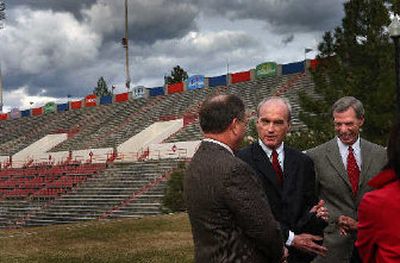Deal announced on Joe Albi Stadium

Spokane-area football teams will be kicking off at Joe Albi Stadium again this September under an agreement announced Thursday to replace Albi’s artificial turf and to keep the 56-year-old facility open for up to 10 more years.
Mayor Dennis Hession and Council President Joe Shogan were joined by Superintendents Brian Benzel of Spokane Public Schools and Al Swanson of Mead School District in making the joint announcement at the stadium.
“This truly is a very timely decision in the best interests of our community and students,” Swanson said.
Added Benzel: “Without a facility like this, our students and programs would be impaired.”
The school districts are agreeing to pay proportionate shares of the new turf in exchange for the city’s commitment to keep the stadium open and maintained for the expected 8- to 10-year life of the turf.
The turf could cost $800,000 or more. Money would come from funds for capital projects, not from teaching funds, Benzel said.
The agreement, for now, resolves a major part of a controversy that erupted last summer when former Mayor Jim West sought to demolish Albi and sell its 89.6 acres of land for some 700 home sites. That idea was killed by the City Council, which was then led by former Council President Hession.
Installation of new turf is coming too late for the Spokane Shadow soccer team. Club owners announced earlier this week that they will not be playing games this spring because the existing turf was recently deemed hazardous by a consultant hired by the club. New turf will not be in place until September.
Hession said he would like the Shadow to return to the stadium in the spring of 2007, but league officials this week said the soccer club has lost its franchise. The Shadow holds a lease with the city to use the stadium through 2011.
Bobby Brett, chief executive officer of the Shadow, said the city essentially shut down his business by not repairing the turf when concerns over its safety arose last year.
Another element of the Albi controversy is the stalled construction of a proposed softball complex adjacent to the stadium, a project that was approved by voters in 1999 but never built. That project was to be funded with $3.5 million in proceeds from the sale of parkland years ago for construction of a Wal-Mart store in the Northpointe shopping area.
Hession said the idea of tearing down Albi and selling off the land was premature because it failed to take into consideration all of the various users and interests with a stake in the property, including the wishes of neighboring residents.
He said he wants the long-term future of Albi – as well as uses of the land – ironed out in coming months, and he wants people with interests in the facility involved in making the decisions.
“We need to decide the long-term future of this stadium,” Hession said.
An engineering report obtained by the city parks department last winter showed that the stadium could be kept open for the next 30 years, but it would take up to $4.1 million in maintenance and improvements. However, only about $88,000 in repairs is needed in the next two years.
A citizens committee that studied the stadium said in February that additional income-producing uses are needed.
“The challenge is to find ways to make Albi viable,” said Shogan, who chaired the citizens committee.
Shogan said some residents are talking about maintaining a large part of the Albi grounds as open space, and possibly trading property with a nearby cemetery to create a park connection between Albi and Riverside State Park along the Spokane River to the west.
Officials said the agreement announced Thursday gives the community time to figure out how to solve the ongoing issues.
Benzel said high school football teams don’t need a stadium the size of Albi, but the schools don’t have any other facility because Albi has served that need for years. He acknowledged there has been some suggestion that the schools build a new, smaller stadium, but that is a subject that needs broader discussion and longer-term planning.